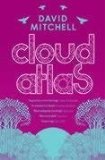Cloud Atlas
By David Mitchell





Rating: Brilliant!

First Published: 2004
Pages: 529
Review © 2009 by Stephen Roof
Genre: Modern Fiction, Literature, Historical Fiction, Science Fiction
Review:
Cloud Atlas by David Mitchell is a challenging and well written novel that makes you really think about the “progress” civilization has made and where we may be heading. This is a novel that is not easily categorized. It’s made up of 6 separate narratives which all take place in different times and locations ranging from the South Pacific in the early 1800s to a post apocalyptic future 400 years in the future. You get a mixture of historical fiction, modern thriller, modern comedy, and science fiction combined into a very literate novel. The narratives are all connected in some way, some directly and others a bit more indirectly. Common themes emerge as Mitchell explores the rise and fall of civilizations, the quest for power and dominance, the divide between “upper” and “lower” classes, and the nature of humanity, in general. But don’t think that this means you’ll be dealing with a boring diatribe. It’s quite the opposite. You’ll be reading first person accounts written with passion and immediacy.
Cloud Atlas is definitely not a light summer reading novel. It takes effort and persistence but you can rest assured that you will be amply rewarded. What makes this novel more challenging than most is that the different narratives are quite disconnected at first and they are written 1st person in a manner that is consistent with the English used at the time. This means that the first narrative from the 1800’s is initially difficult to understand and it takes a few pages to get used to the older style English. As you get more comfortable with the language, you’ll find that the story rapidly gains momentum. Then, once you are fully engaged in the first narrative, it ends abruptly, and a new narrative begins which is jarringly different in style and language with seemingly no connection to the first. Once again, it takes a fair number of pages to get into the new story. The last post-apocalyptic narrative is even more challenging to understand as Mitchell has imagined how language in Hawaii might evolve into a pidgin English after the collapse of civilization. In this case, it may take a dozen pages to become comfortable with the language.
For a quick rundown on the 6 narratives, continue to read this paragraph. If you want to be surprised, skip to the next paragraph. 1st narrative: Early 19th century account of a notary’s adventures traveling in the South Pacific including encounters with the natives, European colonists, and missionaries. 2nd narrative: Early 20th century account of an aspiring composer and his rocky apprenticeship with a fading master composer. 3rd narrative: An exciting modern thriller with a young reporter risking her life to uncover a dangerous corporate conspiracy. 4th narrative: A British comedy about a micro publisher who hits the mother lode but soon finds himself literally trapped in a rest home. 5th narrative: A science fiction look at the future as viewed from the perspective of a cloned “fabricant” who was designed to provide manual labor for “pureblood” humans. 6th narrative: A far future look at a tribe of survivors after an apocalypse exterminated most human life and knowledge on the globe.
All 6 narratives in Cloud Atlas are largely successful although a couple have fairly tenuous ties to the rest. On the other hand, if you like variety, you couldn’t choose a book with more variation in style, language, and genres. This is a great book to give you a taste of some types of novels that may be new to you.
Mixing 19th century style writing with current day modern fiction and with futuristic science fiction is a daring and difficult proposition. Many readers may be turned off by the prospect of reading one or more of the included narratives. However, all the narratives are well written and there is some important synergy between them. I give Mitchell credit for his innovation and ability to meld these seemingly wildly disparate stories into a larger more meaningful whole. In addition, I found myself thinking about the ideas brought up in Cloud Atlas for days after finishing it. If you’re up for a literary challenge, I heartily recommend tackling this unique novel.

